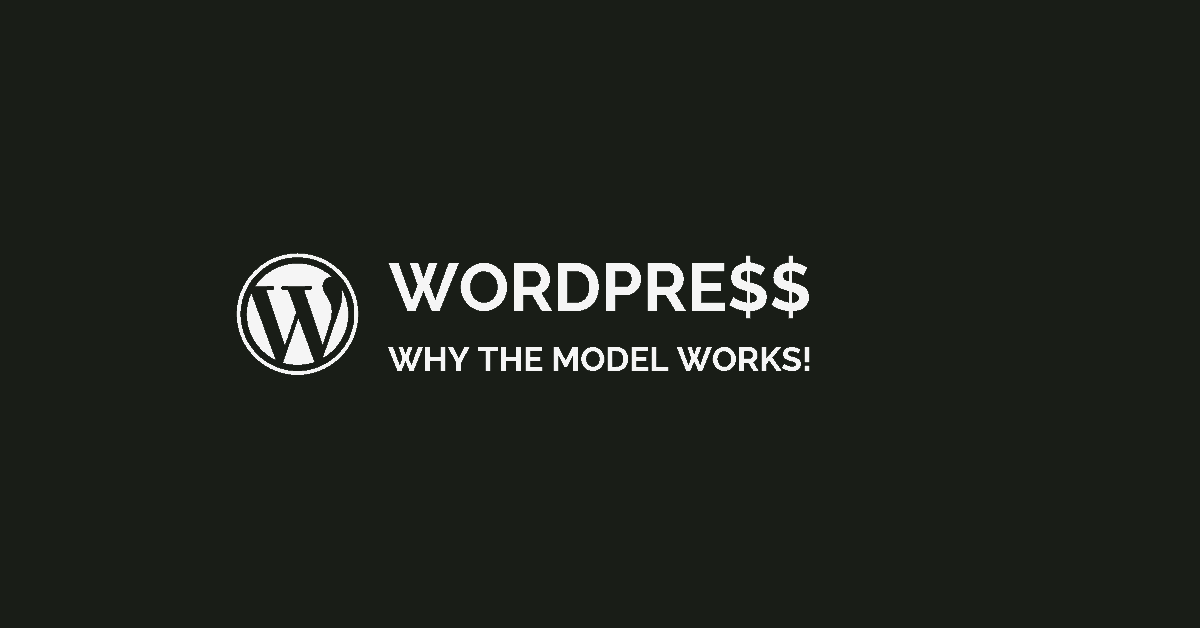Why The WordPress Model Works

If you haven't heard of WordPress, just know that is the largest content management system (CMS for short) that powers a large majority of the websites on the internet. And they're free. Free as in freedom, not as in beer.
This is what the Open Source Model is all about. This is what gives you the permission to use, modify, build upon, and redistribute the software in any way you like without paying any fees. Sounds great right? So, how do they make money??
Well, before I answer that - think about this. There are thousands of talented developers working on the project, contributing codes to keeping it up-to-date and always improving it. And yes, as you may be thinking - there is a cost to this.
So this is where the model works, it's almost like the "Freemium" model, but a bit more than that. That's because, in a typical freemium model, you'd have one company control everything, and every change is up to them - you can't take it and modify it and create your own thing. There are two versions of WordPress, they're the same but different.
One is WordPress the software, which you can download from WordPress.ORG and the other is where they run the latest software and take care of everything technical for you - that's on WordPress.COM - and that's where they make money. Now the latter is owned by Automattic - who's founder is Matt Mullenweg. They are actually a venture capital backed company, which raised over $300 million - so I guess we VCs do some good for society!
And the money is in WordPress.COM - which is where you can start for a paltry sum, and upgrade based on the features you require such as hosting, domain mapping, ad-free site, themes, customizations, support, e-commerce, backups and other bells & whistles aka plugins.
Medium Vs. Ghost Vs. WordPress
Okay, so why mention these names - well because I've used all three and can tell you this - WordPress beats them all, especially if you are looking to expand. However, the recent controversial update from WordPress code named Gutenberg has caused a bit of a stir. And honestly, I don't didn't like it myself. You see, there is a flow that you get with writing, and wordpress moved from being a content editor to a layout editor with this update.
So what I did was go and experience the CMS platforms all over again. And I can tell you this. While Medium probably revolutionized the content editor user experience, they spent $130+ million to do that. But they CONTROL everything, including curation on their platform, and even removed the ability to add individuality with custom domains (so you can use your own domain name). This is what I wrote about in digital share cropping. Their model is simple, there is none. Okay, jokes aside. They still haven't figured out their model, although they believe that a paywall will help them generate money. Imho, I believe they're acting like a newspaper - getting writers to contribute, and putting their best content behind a paywall, only they're not going to be putting ads in it - why would they!? And unless the writers are really making money, I don't think they're going to succeed.
Ghost, on the other hand, was something I really wanted to use, and feel that the co-founders who moved away from supporting WordPress with a revolutionary idea wanted to change the way we publish (just like Medium did). And while I can say Ghost is amazingly fast and easy to use, it is more of a blogging platform than a full-fledged content management system. The challenge I found is being able to find a website hosting provider to service you, and even if you're technically inclined - it still requires a bit of CLI (techies will know this) to get it installed. Their model is similar to WordPress in that you can use the software self-hosted, or you can let them do all the work and you pay them a monthly fee.
But will the open source world, beat the closed source world?
I've heard of developers complain that they've spent hundreds of hours developing plugins, only to receive less than $50 in donations. What they fail to agree is that they've gained a tremendous amount of knowledge & experience that is more valuable for them, even though they made no money from maintaining the plugin for years.
And while everyone will agree that FREE is good, there is a limit to what can be made free. I sincerely hope such developers will continue to develop and support great software, but also include a PRO or PREMIUM version for those who have tasted their software and want more out of it. The challenge is what should be free, and what should be paid - some times even the free software is good enough, and people don't want to upgrade. That's a risk, but that also allows you to perfect your product-price matrix.
In conclusion - all our websites have been running on WordPress, possibly from 2005 onwards (maybe even earlier) so I could be biased in my opinion. I only hope that Matt continues to lead the way to make it the most favored platform.

Member discussion